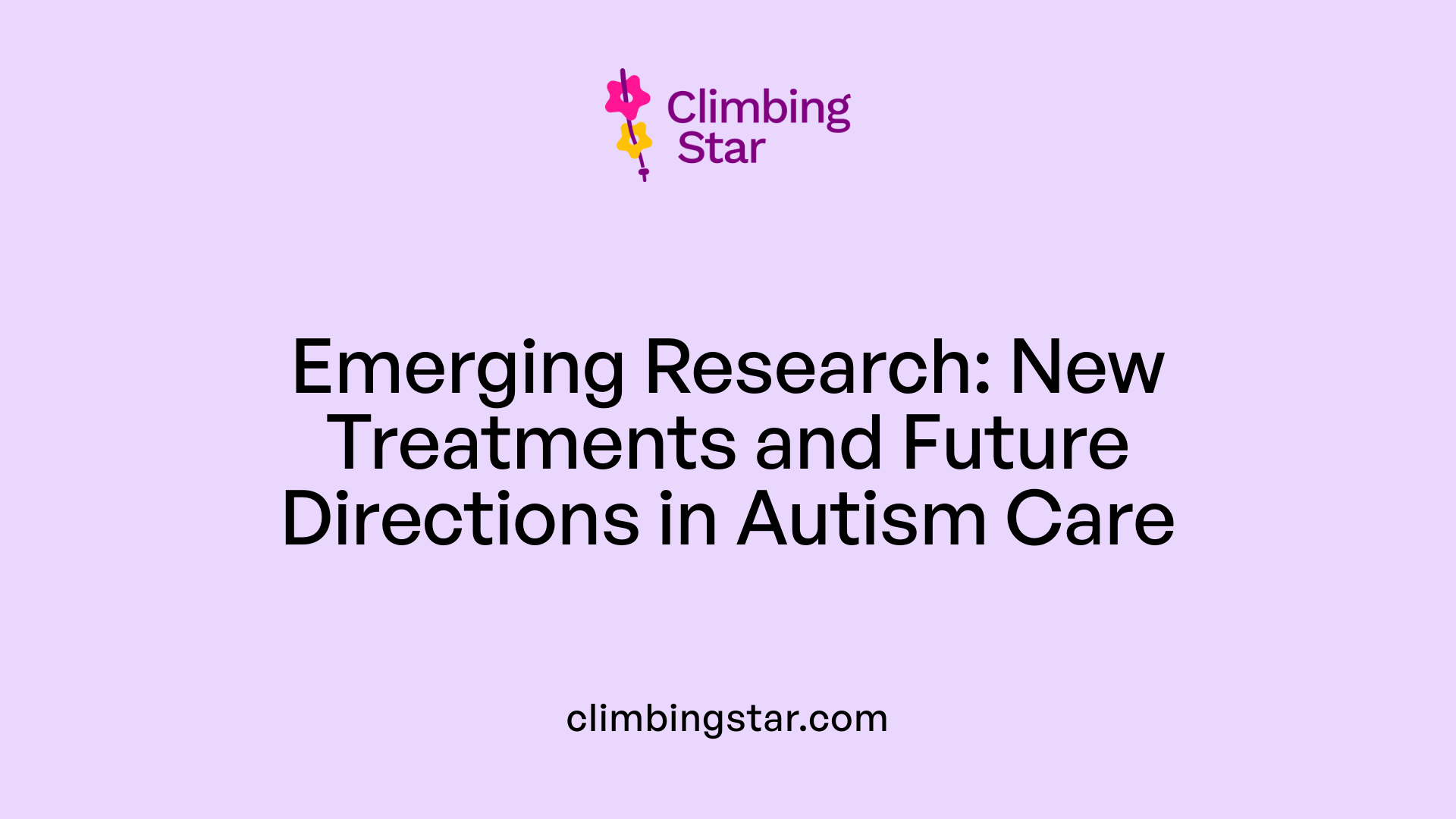Understanding Medication Options for Autism Spectrum Disorder
While there is currently no cure for autism spectrum disorder (ASD), medications can play a vital role in managing specific symptoms and co-occurring conditions. An integrated approach combining pharmacological treatments with behavioral and developmental therapies offers the best outcomes. This article explores the current medication landscape, emerging research, safety considerations, and future prospects in autism treatment, providing a comprehensive guide for families, caregivers, and clinicians.
Overview of Medication and Treatment Approaches in ASD

What are the common medication options and treatments available for autism spectrum disorder (ASD)?
Currently, there is no medication that can cure ASD or directly target its core symptoms such as social communication difficulties and repetitive behaviors. Instead, medications primarily focus on managing associated symptoms like irritability, aggression, hyperactivity, anxiety, and seizures.
FDA-approved options include antipsychotic drugs such as risperidone and aripiprazole. These are prescribed to reduce irritability and behavioral problems in children with autism.
In addition to these, several other medications are used off-label to treat specific challenges. Selective serotonin reuptake inhibitors (SSRIs), such as fluoxetine, are often used to decrease repetitive behaviors and anxiety. Stimulant medications like methylphenidate can help improve focus and decrease hyperactivity, especially in individuals with milder autism symptoms. Anticonvulsants are employed to control seizures, which are common in about one-third of individuals with ASD.
These medications become most effective when combined with behavioral therapies, including applied behavior analysis (ABA), speech therapy, occupational therapy, and other developmental interventions. These combined approaches aim to foster communication, social skills, and daily functioning.
Overall, managing ASD requires a comprehensive treatment plan tailored to each individual’s needs, involving multiple disciplines and strategies.
Which drugs are approved or commonly used for managing autism symptoms?
The most recognized medications for ASD are risperidone and aripiprazole. These drugs are approved by the FDA specifically for reducing irritability and aggression in children with autism.
Beyond these, many families and clinicians use off-label medications. SSRIs like fluoxetine are utilized to help with repetitive behaviors and social difficulties, although their effectiveness varies. Medications such as naltrexone, used to reduce hyperactivity or impulsive behaviors, and guanfacine or clonidine, which help with hyperactivity and sleep problems, are also common.
Research continues into other pharmacological options, with some drugs like memantine and bumetanide being explored for their potential benefits.
These medications are tools to improve quality of life and functional abilities but are not cures for autism.
How do medications used for autism spectrum disorder work and what are their purposes?
Medications for ASD target specific symptoms rather than the core social and communicative aspects. They operate by modulating neurotransmitter systems in the brain.
For example, antipsychotics like risperidone and aripiprazole influence dopamine and serotonin pathways to reduce irritability, aggression, and stereotyped behaviors.
SSRIs work on serotonin levels to decrease repetitive behaviors and manage anxiety. Stimulants affect brain circuits involved in attention and hyperactivity, helping individuals focus better.
Anticonvulsants stabilize neuronal activity to prevent seizures. Anti-anxiety medicines help decrease feelings of panic or fear, common in many individuals with ASD.
Emerging treatments are studying neuropeptides like oxytocin, believed to influence social bonding, and therapies targeting immune or epigenetic mechanisms to improve neural functioning.
These approaches rely on an improved understanding of autism’s biological underpinnings and aim to support neural development and symptom control.
What are the safety considerations and potential risks associated with medications for autism?
All medications carry potential side effects and safety concerns. Common issues include weight gain, sedation, gastrointestinal problems, metabolic changes, and movement disorders.
For instance, risperidone and aripiprazole may cause increased prolactin levels, weight gain, and metabolic syndrome, requiring regular monitoring.
Antidepressants and stimulants may have side effects like sleep disturbances, irritability, or increased blood pressure.
Long-term safety data, especially in children, can be limited. Therefore, it’s crucial for healthcare providers and families to assess the benefits against potential risks continually.
Monitoring side effects, adjusting dosages, and ensuring treatments are part of a broader behavioral and developmental plan are essential steps toward safe management.
What is known about new and emerging research on autism treatments?
Research into autism treatments is advancing rapidly, focusing on personalized medicine and targeted therapies. One promising area involves leucovorin calcium (folinic acid), currently under review by the FDA for treating children with cerebral folate deficiency (CFD). This metabolic condition shares features with autism and may be responsive to folate-based treatments.
Studies suggest leucovorin can improve communication and social interaction, especially in children with specific autoantibodies affecting folate receptors.
Furthermore, breakthroughs in gene editing techniques like CRISPR, stem cell research, and biomarker discovery are paving the way for more individualized therapy options. Advances in neuroimaging and machine learning are enhancing early detection and subtype classification.
While many of these approaches are still in experimental stages, they hold promise for more effective, targeted interventions in the future.
Are there any specific medications currently being researched for autism, such as leucovorin calcium?
Yes, leucovorin calcium, or folinic acid, is a notable example under active research. Evidence indicates that leucovorin may improve core ASD symptoms, particularly in children with cerebral folate deficiency or folate receptor autoantibodies.
Clinical trials have shown improvements in language, social behaviors, and communication with leucovorin treatment.
The FDA is considering approving leucovorin for use in this subgroup, which could represent a move toward metabolic-based, personalized treatments for autism.
This research exemplifies how understanding specific biological mechanisms can lead to targeted therapies, offering hope for more tailored and effective treatments.
What are the current guidelines and resources to understand medical options for autism management?
Autism treatment guidelines emphasize an integrated, multidisciplinary approach involving behavioral, developmental, medical, and educational strategies.
Early screening begins at 18 and 24 months, with prompt intervention improving long-term outcomes. Evidence-based therapies such as applied behavior analysis (ABA), speech therapy, occupational therapy, and structured educational programs like TEACCH are foundational.
Families are encouraged to work closely with healthcare providers, developmental specialists, and community resources. Reputable organizations like Autism Speaks, the CDC, and the American Academy of Pediatrics offer comprehensive tools, research updates, and guidelines.
These resources help families navigate treatment options, understand safety considerations, and stay informed about new advances and clinical trials.
In summary, managing ASD involves a combination of behavioral, developmental, and, where appropriate, pharmacological interventions tailored to each individual's needs. Ongoing research continues to expand understanding and treatment possibilities, aiming for better outcomes and quality of life for individuals with autism.
The Future of Autism Pharmacotherapy
Although no cure exists for autism yet, ongoing research and medical advancements are promising new options with targeted mechanisms and greater efficacy. The integration of pharmacological treatments with behavioral and developmental therapies remains the most effective strategy. Families and clinicians should stay informed through reputable resources, participate in ongoing research studies, and approach treatment plans with a comprehensive, individualized perspective to optimize outcomes and support development in individuals with ASD.
References
- Medication Treatment for Autism | NICHD
- FDA Takes Action to Make a Treatment Available for ...
- Medicines for Treating Autism's Core Symptoms
- Autism spectrum disorder - Diagnosis and treatment
- FDA to approve drug to treat autism symptoms
- Treatment and Intervention for Autism Spectrum Disorder
- Autism Spectrum Disorder: Parents' Medication Guide
- List of 13 Autism Medications Compared






